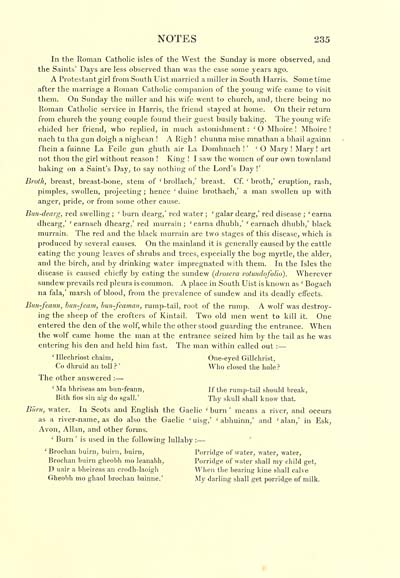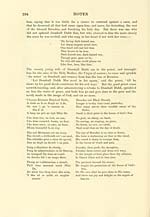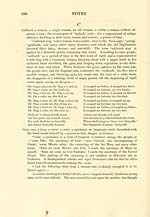Blair Collection > Carmina gadelica > Volume 2
(255)
Download files
Complete book:
Individual page:
Thumbnail gallery: Grid view | List view

NOTES 235
In the Roman Catholic isles of the West the Sunday is more observed, and
the Saints' Days are less observed than was the case some years ago.
A Protestant girl from South Uist married a miller in South Harris. Some time
after the marriage a Roman Catholic companion of the young wife came to visit
them. On Sunday the miller and his wife went to church, and, there being no
Roman Catholic service in Harris, the friend stayed at home. On their return
from church the young couple found their guest busily baking. The young wife
chided her friend, who replied, in much astonishment : ' O Mhoire ! Mhoire !
nach tu tha gun doigh a nighean ! A Righ ! chunna mise mnathan a bhail againn
fhein a fuinne La Feile gun ghuth air La Domhnach ! ' ' O Mary ! Mary ! art
not thou the girl without reason ! King ! I saw the women of our own townland
baking on a Saint's Day, to say nothing of the Lord's Day !'
Broth, breast, breast-bone, stem of ' brollach,' breast. Cf. ' broth,' eruption, rash,
pimples, swollen, projecting; hence ' duine brothach,' a man swollen up with
anger, pride, or from some other cause.
Bun-dearg, red swelling ; ' burn dearg,' red water ; 'galar dearg,' red disease ; 'earna
dhearg,' ' earnach dhearg,' red murrain ; ' eai-na dhubh,' ' earnach dhubh,' black
murrain. The red and the black murrain are two stages of this disease, which is
produced by several causes. On the mainland it is generally caused by the cattle
eating the young leaves of shrubs and trees, especially the bog myrtle, the alder,
and the birch, and by drinking water impregnated with them. In the Isles the
disease is caused chiefly by eating the sundew (druscra rotundo folio). Wherever
sundew prevails red pleura is common. A place in South Uist is known as ' Bogach
na fala,' marsh of blood, from the prevalence of sundew and its deadly effects.
Bun-feann, hun-feam, bun-feaman, rump-tail, root of the rump. A wolf was destroy-
ing the sheep of the crofters of Kintail. Two old men went to kill it. One
entered the den of the wolf, while the other stood guarding the entrance. When
the wolf came home the man at the entrance seized him by the tail as he was
entering his den and held him fast. The man within called out : —
' lUechriost cliaim. One-eyed Gillchrist,
Co dhruid an toll .' ' Who closed the hole.^
The other answered : —
' Ma bhriseas am bun-feann, If the rump-tail should break,
Bith fios sin aig do sgall.' Thy skull shall know that.
Burn, water. In Scots and English the Gaelic ' burn ' means a river, and occurs
as a river-name, as do also the Gaelic ' uisg,' ' abhuinn,' and ' alan,' in Esk,
Avon, Allan, and other forms.
' Burn ' is used in the following lullaby : — *
'Brochan buirn, buirn, buirn. Porridge of water, water, water,
Brochaii buirn gheobh mo leanabh. Porridge of water shall my child get,
D uair a bheireas au crodh-laoigh When the bearing kine shall calve
Gheobh mo ghaol brochan bainne.' My darling shall get porridge of milk.
In the Roman Catholic isles of the West the Sunday is more observed, and
the Saints' Days are less observed than was the case some years ago.
A Protestant girl from South Uist married a miller in South Harris. Some time
after the marriage a Roman Catholic companion of the young wife came to visit
them. On Sunday the miller and his wife went to church, and, there being no
Roman Catholic service in Harris, the friend stayed at home. On their return
from church the young couple found their guest busily baking. The young wife
chided her friend, who replied, in much astonishment : ' O Mhoire ! Mhoire !
nach tu tha gun doigh a nighean ! A Righ ! chunna mise mnathan a bhail againn
fhein a fuinne La Feile gun ghuth air La Domhnach ! ' ' O Mary ! Mary ! art
not thou the girl without reason ! King ! I saw the women of our own townland
baking on a Saint's Day, to say nothing of the Lord's Day !'
Broth, breast, breast-bone, stem of ' brollach,' breast. Cf. ' broth,' eruption, rash,
pimples, swollen, projecting; hence ' duine brothach,' a man swollen up with
anger, pride, or from some other cause.
Bun-dearg, red swelling ; ' burn dearg,' red water ; 'galar dearg,' red disease ; 'earna
dhearg,' ' earnach dhearg,' red murrain ; ' eai-na dhubh,' ' earnach dhubh,' black
murrain. The red and the black murrain are two stages of this disease, which is
produced by several causes. On the mainland it is generally caused by the cattle
eating the young leaves of shrubs and trees, especially the bog myrtle, the alder,
and the birch, and by drinking water impregnated with them. In the Isles the
disease is caused chiefly by eating the sundew (druscra rotundo folio). Wherever
sundew prevails red pleura is common. A place in South Uist is known as ' Bogach
na fala,' marsh of blood, from the prevalence of sundew and its deadly effects.
Bun-feann, hun-feam, bun-feaman, rump-tail, root of the rump. A wolf was destroy-
ing the sheep of the crofters of Kintail. Two old men went to kill it. One
entered the den of the wolf, while the other stood guarding the entrance. When
the wolf came home the man at the entrance seized him by the tail as he was
entering his den and held him fast. The man within called out : —
' lUechriost cliaim. One-eyed Gillchrist,
Co dhruid an toll .' ' Who closed the hole.^
The other answered : —
' Ma bhriseas am bun-feann, If the rump-tail should break,
Bith fios sin aig do sgall.' Thy skull shall know that.
Burn, water. In Scots and English the Gaelic ' burn ' means a river, and occurs
as a river-name, as do also the Gaelic ' uisg,' ' abhuinn,' and ' alan,' in Esk,
Avon, Allan, and other forms.
' Burn ' is used in the following lullaby : — *
'Brochan buirn, buirn, buirn. Porridge of water, water, water,
Brochaii buirn gheobh mo leanabh. Porridge of water shall my child get,
D uair a bheireas au crodh-laoigh When the bearing kine shall calve
Gheobh mo ghaol brochan bainne.' My darling shall get porridge of milk.
Set display mode to: Large image | Transcription
Images and transcriptions on this page, including medium image downloads, may be used under the Creative Commons Attribution 4.0 International Licence unless otherwise stated. ![]()
| Early Gaelic Book Collections > Blair Collection > Carmina gadelica > Volume 2 > (255) |
|---|
| Permanent URL | https://digital.nls.uk/75839837 |
|---|
| Description | Volume 2. Uibe (incantations) Measgain (miscellaneous) Notes. Names of the reciters of the poems. |
|---|---|
| Shelfmark | Blair.62 |
| Attribution and copyright: |
|
| Description | A selection of books from a collection of more than 500 titles, mostly on religious and literary topics. Also includes some material dealing with other Celtic languages and societies. Collection created towards the end of the 19th century by Lady Evelyn Stewart Murray. |
|---|
| Description | Selected items from five 'Special and Named Printed Collections'. Includes books in Gaelic and other Celtic languages, works about the Gaels, their languages, literature, culture and history. |
|---|

